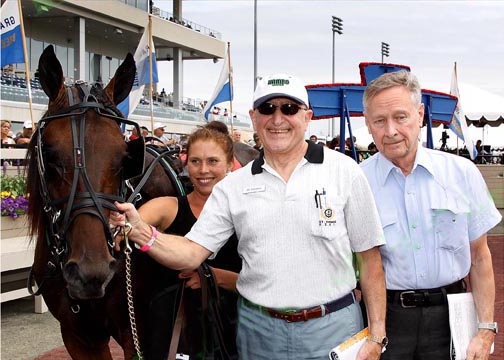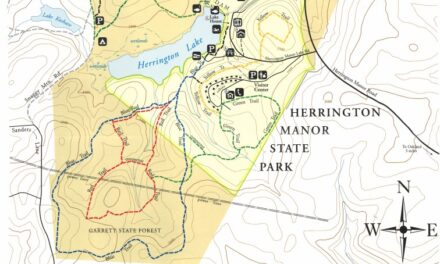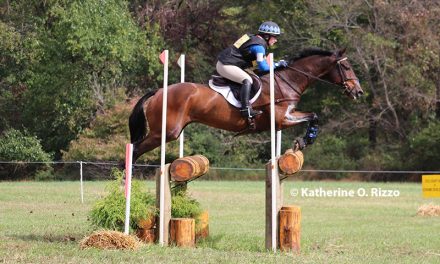Maryland Breeder Spotlight: ENS Stables
by Katherine O. Rizzo (first published in the January 2022 Equiery)
According to the U.S. Trotting Association, 67 of the horses that have run in purse races in North America were bred by Eli Solomon, and those 67 collectively have won over $6.5 million in earnings. Put another way, Eli Solomon’s North American trotters win an average of almost $100,000 per horse. And several of Solomon’s homebreds have crossed the Atlantic to win big in Europe as well.
As a result, it goes without saying that Solomon is passionate about promoting the Maryland harness industry, both nationally and abroad.
The Engineer
Solomon always had a love of animals, in particular dogs as pets and watching horses race. His deep dive into the harness industry, however, did not begin until much later in his life. “It was the early ‘80s and some friends in the industry invited me to join a small syndicate to claim a pacer,” he explained.
Before joining the syndicate, Solomon, who is a retired engineer from Northrop Grumman Corporation’s Electronic Systems BWI facility, wanted to learn more about the sport. “I wanted to really educate myself so I did a lot of research,” he said. He liked what he read and jumped in on a 25% share in a pacer. “It was my first taste of the sport.” The syndicate ended up selling that pacer, but Solomon was hooked.
“I then got this pacer from the last sale at Liberty Bell [Raceway] with the help of a trainer at Freestate [Raceway]. She also convinced me to buy a trotting filly,” Solomon said. This new partnership did not go as planned, and Solomon and the trainer parted ways, splitting up the two horses.
“It all started with the dissolution of the partnership with the trainer at Freestate Raceway when I elected to take the trotting-bred filly Winsomuch and relinquished my ownership interest in the pacing filly,” he said. “I also felt that a trotter with a good gait could be more valuable in many ways; financially as a racehorse, aesthetically to watch, financially as a broodmare or stallion.” In addition, Solomon pointed out that most European countries hold almost exclusively trotting races. He has exclusively bred trotters ever since.
ENS Tag Session
Located in Ocean City, ENS Stables is Solomon’s home base for his breeding operation where at the peak of his business, he had over 30 horses. “From a quarter of one pacer to 30 to 40 horses,” he said with a chuckle. It was through ENS Stables that several internationally successful trotters were produced, most tracing back to that very first trotter, Winsomuch.
“Her first foal was a filly I named Regression, which was a name constructed from familial names,” he said. “Regression produced a filly in 1999 I named ENS Tag Session that became a good producer with two of her foals earning World Champion status.”
ENS Tag Session herself set a record as a three-year-old by trotting a furlong in 1:56.1. She netted $94,668 in lifetime earnings. More significantly, she produced the top three horses by earnings from ENS Stables including World Champions Triumphant Caviar and Centurion ATM.
As a two-year-old, Triumphant Caviar won the Pennsylvania Sire Stakes at The Meadows and finished second in the Bridger Trotting Series at Mohawk. He also finished third in the International Stallion Stakes. As a three-year-old, he won the Old Oaken Bucket in Delaware, Ohio, where he set the World Record of 1:54.2 for a stallion on a half-mile track. He also won the Pennsylvania Sire Stakes for a second time as a three-year-old.
He continued to race, and win, through his four-year-old season and set a new Canadian Record of 1:51.4 for stallions four years old or older at Mohawk Raceway. That year, he was considered the fastest trotter in North America. He still holds that Canadian record and also broke the track record at Indian Downs when he won the Pride in Progress Trot in 1:53.1.
Triumphant Caviar is the richest son of SJ’s Caviar with $775,605 in career earnings and now stands at Abby Stables in Ohio.
Centurion ATM (another son of SJ’s Caviar), has career earnings of $728,894. He raced through his five-year-old season with win highlights including the Peter Haughton Memorial, where he set a World Record of 1:53.2, and the John Simpson Memorial as a two-year-old and Colonial Trot as a three-year-old.
Overall he had nine stakes wins and retired to stud duties in 2018 where he stood in Sweden until 2021. Centurion ATM now stands at Kentuckiana Farms in Kentucky.
SJ’s Caviar
In 1998, Solomon was attending the Rosecroft Raceway sale with friend Don Bartling, who until then had owned and raced pacers only. “I saw this really nice yearling and convinced Don he should go in on him with me,” Solomon stated. Bartling became part owner in a trotter that would go on to win nearly $1.3 million.
SJ’s Caviar is by S JS Photo and out of the T V Yankee mare Spawning. As a two-year-old, he won five stakes races. As a three-year-old, he went on to win another nine races and was fourth in the Breeders Crown, final (G1). The colt was the U.S. Three-Year-Old Trotter of the Year and all in all, he had 30 starts and won 20 of them.
Solomon and Bartling sold SJ’s Caviar to Hanover Shoe Farms (PA) where he stood at stud for several years before the syndicate sold him to Flevofarm in Sweden where he remains at stud today.
In addition to SJ’s Caviar, ENS Snapshot, ENS Crescendo, ENS Soaring Raptor, ENS Caviar’s Sun are all standing stud in Europe and were all produced by Solomon’s ENS Stables. “Eunice Boko, who is a daughter of ENS Tag Session, is a broodmare in Sweden too,” Solomon added.
Maryland’s Horse Industry
The Maryland Horse Industry Board was founded in 1998, Solomon was one of the first Governor-appointed board members. Solomon and MHIB Chairman Jim Steele are the only two original board members still serving today.
“When I first joined the board, many people thought of racing in Maryland as Pimlico and the Thoroughbreds,” Solomon said. “Now, a there is a lot more consideration of the Standardbreds as part of the racing industry.”
“Eli has been a valued member of MHIB for many years, ably representing the state’s harness racing industry and serving under at least three Governors,” said MHIB Executive Director Ross Peddicord.
One of Solomon’s biggest contributions to the Maryland harness industry was his work within MHIB to help bring slots revenue to Maryland’s racing industry as a whole. “You have to understand, at the time the sire stakes program in Pennsylvania was much more lucrative than in Maryland,” he explained. “They also have a $10 million breeders fund and Maryland didn’t have anything close to that.”
With the addition of slots revenue, Solomon said, “things improved in both the money involved in stakes races and the overnight purses.” The current slots distribution ratio is 80:20 with 80% going to the Thoroughbred industry and 20% to Standardbreds. “Pennsylvania still has a larger sires program but Maryland has its own sires stakes program and the Maryland Standardbred Fund, which both help boost Maryland-bred horses.”
In addition to representing the harness industry within MHIB, Solomon has been on the management side of Rosecroft Raceway when it was owned by the Cloverleaf Standardbred Association, and has served on the board for Cloverleaf as well as the board of the Maryland Standardbred Breeders Association.
“Eli is an exemplary board member, loves harness racing and has made a significant contribution to the horse industry and the state,” Peddicord said.
Pacers vs. Trotters
• Pacers are Standardbred horses that race by moving the legs on the same side of their body in unison.
• Trotters are Standardbred horses that race by moving the diagonal legs in unison.













